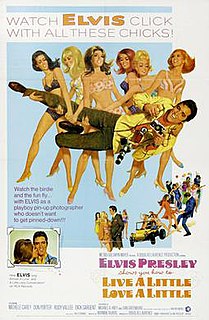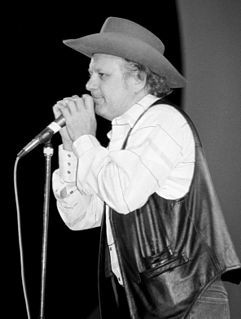
A Date with Elvis is a compilation album by American singer and musician Elvis Presley, issued on RCA Victor Records in July 1959. The album compiled a selection of previously released material from multiple sessions at Sun, an August 1956 recording session at 20th Century Fox Stage One and two from Radio Recorders in Hollywood. The album reached #32 on the Billboard Top Pop Albums chart.

Something for Everybody is the sixth studio album by American singer and musician Elvis Presley, released on RCA Victor in mono and stereo, LPM/LSP 2370, in June 1961. Recording sessions took place on November 8, 1960, at Radio Recorders in Hollywood, and on March 12, 1961 at RCA Studio B in Nashville, Tennessee. In the United States, it peaked at number 1 on Billboard's Top Pop LPs chart. It was certified Gold on July 15, 1999 by the Recording Industry Association of America.

His Hand in Mine is the fifth studio album by American singer and musician Elvis Presley, released on RCA Victor Records in mono and stereo, LPM/LSP 2328, in November 1960. It was the first of three gospel music albums that Presley would issue during his lifetime. Recording sessions took place on October 30 and 31, 1960, at RCA Studio B in Nashville, Tennessee. It peaked at #13 on the Top Pop Albums chart. It was certified Gold on April 9, 1969 and Platinum on March 27, 1992 by the Recording Industry Association of America.

Elvis' Gold Records Volume 4 is a greatest hits album by American rock and roll singer Elvis Presley, issued by RCA Victor in mono and stereo, LPM/LSP 3921, in January 1968, with recording sessions taking place over an eight-year span at RCA Studio B in Nashville, Tennessee, and at RCA Studios and Radio Recorders in Hollywood. It is a compilation of hit singles released between 1961 and 1967, peaking at number 33 on the Billboard 200. It was certified Gold on March 27, 1992 by the Recording Industry Association of America.
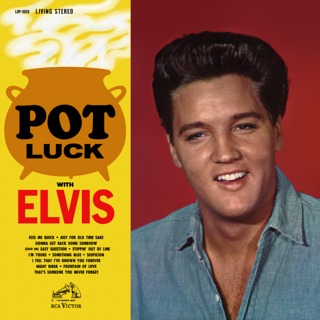
Pot Luck with Elvis is the seventh studio album by American singer and musician Elvis Presley, released on RCA Victor in mono and stereo, LPM/LSP 2523, in June 1962. Recording sessions took place on March 22, 1961, at Radio Recorders in Hollywood, and on June 25 and October 15, 1961, and March 18 and March 19, 1962, at RCA Studio B in Nashville, Tennessee. It peaked at number 4 on the Billboard Top LP's chart.

Loving You is the first soundtrack album by American rock and roll singer Elvis Presley. It was released by RCA Victor Records in mono, LPM 1515, in July 1957 to accompany his first starring film, Loving You (1957). Recording sessions took place on January 15, 16, 17, and 18, 1957, at the Paramount Pictures Scoring Stage, and on January 12, 13, 19, and February 23 and 24, 1957, at Radio Recorders in Hollywood. These are the first sessions where Steve Sholes is officially listed as producer. It spent ten weeks at No. 1 on the Billboard Top Pop Albums chart. It was certified Gold on April 9, 1968 by the Recording Industry Association of America.

G.I. Blues is the third soundtrack album by American singer and musician Elvis Presley, released by RCA Victor in mono and stereo, LPM/LSP 2256, in October 1960. It is the soundtrack to the 1960 film of the same name in which he starred. Recording sessions took place on April 27 and 28, and May 6, 1960, at RCA Victor Studio C and Radio Recorders in Hollywood, California. The album topped the Billboard Top Pop Album chart. It was certified Gold on March 13, 1963 and Platinum on March 27, 1992 by the Recording Industry Association of America.

Blue Hawaii is the fourth soundtrack album by American singer Elvis Presley, released on RCA Victor Records in mono and stereo, LPM/LSP 2426, on October 20, 1961. It is the soundtrack to the 1961 film of the same name starring Presley. In the United States, the album spent 20 weeks at the number one slot and 39 weeks in the Top 10 on Billboard's Top Pop LPs chart. It was certified Gold on December 21, 1961, Platinum and 2x Platinum on March 27, 1992 and 3x Platinum on July 30, 2002 by the Recording Industry Association of America. On the US Top Pop Albums chart Blue Hawaii is second only to the soundtrack of West Side Story as the most successful album of the 1960s.

Double Trouble is the fifteenth soundtrack album by American singer and musician Elvis Presley, released by RCA Victor in mono and stereo, LPM/LSP 3787, in June 1967. It is the soundtrack to the 1967 film of the same name starring Presley. Recording sessions took place at Radio Recorders and at Metro-Goldwyn-Mayer studios in Hollywood, California, on June 28, 29, and 30, 1966. It peaked at number 47 on the Billboard 200.
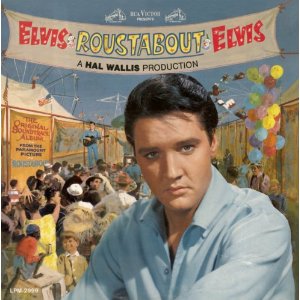
Roustabout is the ninth soundtrack album by American singer and musician Elvis Presley, released on RCA Victor Records in mono and stereo, LPM/LSP 2999, in October 1964. It is the soundtrack to the 1964 film of the same name starring Presley. Recording sessions took place at Radio Recorders in Hollywood, California, on March 2 and 3, and April 29, 1964. It peaked at number one on the Billboard Top LP's chart. It was certified Gold on May 20, 1988 by the Recording Industry Association of America. The album would be Presley's final soundtrack to reach number one and his last number one album until 1973's Aloha From Hawaii: Via Satellite.
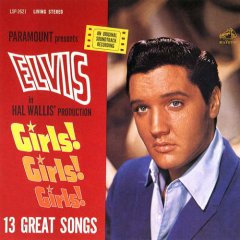
Girls! Girls! Girls! is the fifth soundtrack album by American singer and musician Elvis Presley, released on RCA Victor Records in mono and stereo, LPM/LSP 2426, in November 1962. It accompanied the 1962 film of the same name starring Presley. Recording sessions took place at Radio Recorders in Hollywood on March 26, 27, and 28, 1962. It peaked at number three on the Top LP's chart. It was certified Gold on August 13, 1963 by the Recording Industry Association of America.

It Happened at the World's Fair is the sixth soundtrack album by American singer and musician Elvis Presley, released by RCA Victor in mono and stereo, LPM/LSP 2697, in April 1963. It is the soundtrack to the 1963 film of the same name starring Presley. Recording sessions took place at Radio Recorders in Hollywood on August 30 and September 22, 1962. It peaked at number four on the Billboard Top Pop Albums chart.

Fun in Acapulco is the seventh soundtrack album by American singer and musician Elvis Presley, released on RCA Victor Records in mono and stereo, LPM/LSP 2756, in November 1963 – the November 1 date is disputed. It is the soundtrack to the 1963 film of the same name starring Presley. Recording sessions took place at Radio Recorders in Hollywood on January 22 and 23, 1963; and at RCA Studio B in Nashville, Tennessee, on May 26 and 27, 1963. It peaked at number three on the Billboard Top Pop Albums chart. The album, along with the accompanying film, would be Presley's last release before the arrival of Beatlemania.

Kissin' Cousins is the eighth soundtrack album by American singer and musician Elvis Presley, released by RCA Victor in mono and stereo, LPM/LSP 2894, in April 1964. It is the soundtrack to the 1964 film of the same name starring Presley. Recording sessions took place at RCA Studio B in Nashville, Tennessee, on May 26 and 27, and September 29 and 30, 1963. It peaked at number six on the Billboard Top LP's chart. The album was certified Gold on March 27, 1992 by the Recording Industry Association of America.

Girl Happy is the tenth soundtrack album by American singer and musician Elvis Presley, released on RCA Victor Records in mono and stereo, LPM/LSP 3338, in March 1965 – the March 1 date is disputed. It is the soundtrack to the 1965 film of the same name starring Presley. Recording sessions took place at Radio Recorders in Hollywood, California, on June 10, 11, 12, and vocal overdubs by Presley on June 15, 1964. It peaked at number eight on the Top LP's chart. It was certified Gold on July 15, 1999 by the Recording Industry Association of America.

Harum Scarum is the eleventh soundtrack album by American singer and musician Elvis Presley, released by RCA Victor in mono and stereo, LPM/LSP 3468, in November 1965. It is the soundtrack to the 1965 film of the same name starring Presley. Recording sessions took place at RCA Studio B in Nashville, Tennessee, on February 24, 25, and 26, 1965. It peaked at number eight on the Top LP's chart.

Frankie and Johnny is the twelfth soundtrack album by American singer and musician Elvis Presley, released on RCA Victor Records in mono and stereo, LPM/LSP 3553, on March 1, 1966. It is the soundtrack to the 1966 film of the same name starring Presley. Recording sessions took place at Radio Recorders in Hollywood, California, on May 12, 13, and 14, 1965. It peaked at number 20 on the Top LP's chart. It was certified Gold and Platinum on January 6, 2004 by the Recording Industry Association of America.

Paradise, Hawaiian Style is the thirteenth soundtrack album by American singer and musician Elvis Presley, released by RCA Victor in mono and stereo, LPM/LSP 3643, in June 1966. It is the soundtrack to the 1966 film of the same name starring Presley. Recording sessions took place at Radio Recorders in Hollywood, California, on July 26 and 27, and August 2, 1965. It peaked at number 15 on the Top LP's chart.

Spinout is the fourteenth soundtrack album by American singer and musician Elvis Presley, released by RCA Victor in mono and stereo, LPM/LSP 3702, on October 31, 1966. It is the soundtrack to the 1966 film of the same name starring Presley. Recording sessions took place at Radio Recorders in Hollywood, California, on February 16 and 17, 1966. It peaked at number 18 on the Top Pop Albums chart.

Clambake is the sixteenth soundtrack album by American singer and musician Elvis Presley, released by RCA Victor in mono and stereo, LPM/LSP 3893, in October 1967. It is the soundtrack to the 1967 film of the same name starring Presley. He entered RCA Studio B in Nashville, Tennessee on February 21, 1967 for Recording sessions for his twenty fifth film. Supplemental material sessions took place on September 10 and 11, 1967. It peaked at number 40 on the Billboard 200.








